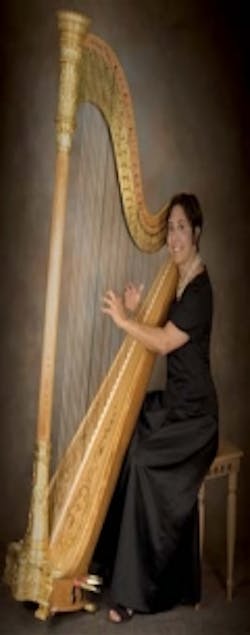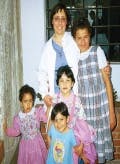Harps and Hygiene
By Cathy Hester Seckman, RDH
What do the King of Tonga, two Guatemalan orphans, a 90-year-old Wurlitzer harp, and a dental hygienist have in common? Maryjean Zarick Penaranda, RDH, of Longwood, Fla., performed for the king, adopted the orphans, and rescued the harp.
Sounds like a great story, doesn’t it? Maryjean didn’t start out to be a hygienist. From her hometown in Ohio she attended Youngstown State University on a music scholarship, then completed a bachelor’s degree in music therapy. She started as a voice major, but learned to play the harp at Ohio University. She moved to Napa, Calif., after college to work as a music therapist in the state hospital system, and from there she went to Salem, Ore., to teach in the music therapy department at Willamette University. After being laid off from the university in 1977, she moved to Seattle.
“Music therapy is a discipline that can be approached two ways,” she said. “Behavioral science uses music to help initiate behavioral changes. It’s used in special education and similar settings. More recently, music therapy is used in medical settings for stress reduction, to boost the immune system, and to suppress chemotherapy nausea. Live music can help reduce the need for sedatives by 50%.
“Music therapy can be passive, as in a hospice setting, or active, as in having patients participate. Therapeutics, not performance, is the goal.”
In Seattle, Maryjean founded a music publishing company and sold music through mail order. She also worked as a freelance harpist, playing for weddings, restaurants, and special events, including a diplomatic dinner for the King of Tonga. Her freelance work included a summer playing aboard the SS Universe World Explorer cruise ship in Alaska.
The logistics of being a freelance harpist are intimidating. “You need a big car, for one thing. A harp can be six feet tall and weigh 85 pounds, so it has to lie flat during transport. You also need a hand truck (dolly) to move it around.” Realistically, one needs at least four years of intensive study to become proficient enough to work as a professional harpist.
A harp needs to be tuned frequently, even during performances. “The strings are wire, gut, or nylon. They lose their tuning at different rates. The bass strings might be going sharp while the treble strings may be going flat. You don’t play the harp unless you’re a patient person. Garrison Keillor once said a harp is like an elderly parent that has to be helped in and out of the car and kept out of drafts.”
By 1991, Maryjean was suffering from exhaustion and burnout. “One day while getting my teeth cleaned I told my hygienist that I was looking for a new job where I could make full-time pay for part-time work, find a job anywhere in the country, be respected, and be intellectually stimulated. She suggested I become a dental hygienist.”
She decided it was fate. There was a hygiene program four miles from her home. “It took me a year to pick up microbiology, organic chemistry, and anatomy and physiology. My 4.0 GPA helped me gain entrance to Shoreline Community College in Seattle, and also win a scholarship from the Oral Health Institute.”
After graduating in 1994, she gave up music and dedicated herself to dental hygiene. “Although music can be exciting and fulfilling, it took a lot out of me. When I was working as a musician I felt isolated. I worked evenings and weekends and was gone for long periods of time on the cruise ship. There was no opportunity to date or have children. I looked around and saw that my friends were getting married, buying houses, having children. As a harpist, I didn’t even have a regular paycheck to qualify for a mortgage. I wanted the kind of life my friends had, so I needed a more traditional career. Hygiene was it. My harp now sat in a corner under a dust cover.”
Maryjean Penaranda enjoyed working for dental missions in Guatemala. Above, she’s holding the hand of her adopted daughter, Nancy.
Throwing herself into her new career, Maryjean became active in hygiene volunteer work at the Union Gospel Mission in Seattle, and on the Northwest Medical Mission dental van in King County, Wash. She also found a husband.
“When I married Frederic Penaranda, I became an instant mom to his seven-year-old son, Julian. Frederic and I wanted more children, but we had several miscarriages. We tried for infant adoption, but found that birth mothers weren’t inclined to choose us because we were older. Eventually, we gave up. I decided I’d just fulfill myself by doing mission trips.”
In 2000, she joined a dental mission trip to an orphanage in Guatemala. “There was a little girl at the orphanage who was about four. I felt a huge attachment to her. After lunch, someone brought her back to the clinic because she kept insisting I was her mother. The orphanage workers kept bringing her to me during the week, encouraging the relationship. As I was preparing to leave, the orphanage director asked if I was in any position to adopt the little girl.”
Ultimately, the Penarandas decided they would adopt the four-year-old, along with an unrelated older girl. “The adoptions took 13 months, so the girls were five and 10 when they entered the United States. Nancy is 12 now, and Norma is 18. I’ve spent the last eight years helping these two girls heal from the past. It’s been a huge job! I took a whole year off work to home-school Norma because she could not speak English and was not up to grade level.
There was certainly no time for music during those years. Today they’re both healthy, happy teenagers. Nancy plays flute, and Norma is more sports-minded.”
In 2004, the family relocated to Orlando. In the new environment, Maryjean started feeling the urge to become involved in music again. She once again wrote and published music for the harp under her maiden name, Maryjean Zarick. To distribute her music digitally, she established a subscription Web site for harpists at www.HarpMusicNow.com. She was also recruited by the Sweetwater Fine Arts Academy in Longwood, Fla., to establish a harp program with money that had been donated for that purpose.
Last winter, she entered several pieces in a composers’ competition sponsored by the Seattle chapter of the American Harp Society. Unbelievably, she took both first and second place. She received a cash prize and has signed a publishing contract. “It’s the first competition I ever entered. I’ll definitely do it again. Winning was such a luxurious feeling. When you work alone, you never know if your music is any good. Winning was confirmation, a validation.”
Winning also gave her the confidence to apply for graduate school and work on a master’s degree in music composition. She already has a multimedia performance project in mind for her master’s thesis. She believes that her experiences as a dental hygienist and mother have brought a new maturity in her music. “My playing and writing have a depth that was not possible before,” she said.
She currently owns three harps. The smallest is a travel harp with only 22 strings that will fit in the overhead compartment of an airplane. Her midsize harp is a custom-built 34-string Celtic harp that is fairly portable and fits easily into a hatchback car. Recently she found a 90-year-old Wurlitzer concert harp in an antique store. Concert harps have thousands of moving parts that control the action.
Maryjean knew the value of the Wurlitzer, and bought it even though it needed a new neck and complete overhaul. The restoration took six months, and now the Wurlitzer sits in Maryjean’s living room, and she plays it after work every day.
Maryjean still works 20 hours a week as a hygienist. “My boss, Dr. Scott Ebner in Winter Park, is the best boss a hygienist could ever ask for. He treats me like family. I couldn’t pursue music if not for the kindness, generosity, and fabulous sense of humor of Dr. Ebner and his wife, Linda. I also work with the world’s best dental assistant, Kathy Bennett. She’s my ‘Radar O’Reilly.’ She knows what I need even before I do. All three have embraced what I do with music. I can talk to them and they’re happy for me. After 15 years in hygiene, this is the happiest I’ve ever been in a dental office.”
At age 55, Maryjean is far from thinking about retirement in either of her professions. Soon she will volunteer as a harp therapist with a hospice program. When asked about her life she says, “I love Florida, I love my family, and I love my job and my boss. I’m active in my church, and I would love to do more dental mission work.” It’s easy to believe her when she says, “I’ll just keep going and going.”
Cathy Hester Seckman, RDH, is a frequent contributor based in Calcutta, Ohio. Besides working in a pediatric dental practice, Seckman is a prolific freelance writer, a book indexer, and a speaker on dental and writing/indexing topics. She can be reached at [email protected].

